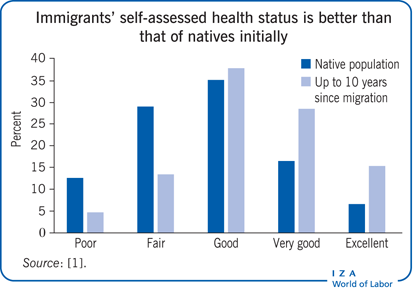Elevator pitch
In common anti-immigrant rhetoric, concerns are raised that immigrants bring diseases with them to the host country that threaten the health of the resident population. In reality, extensive empirical research over several decades and across multiple regions and host countries has documented that when immigrants arrive in the host country they are healthier than native residents, a phenomenon termed the “healthy immigrant effect.” This initial advantage deteriorates with time spent in the host country, however, and immigrants’ health status converges toward (or below) that of native residents.
Key findings
Pros
On arrival, immigrants are healthier than native residents (the “healthy immigrant effect”).
New immigrants bring healthier habits and lifestyles, such as physical activity, low-calorie diets, close family ties, and protective cultural factors.
Immigration serves as an experimental framework for testing the effects of environmental factors on diseases and on ethnic health disparities.
Good health affects all spheres of life, including labor market performance.
Cons
Immigrants’ initial health advantage deteriorates with time in the host country and converges toward (or below) the health status of native residents.
Disparities between immigrant and native residents may differ across dimensions of health and health metrics and by gender and country of origin and residence.
Immigrants’ self-reports of health conditions may under-report their true health status.
Statistical analyses may be biased downward because they fail to consider sick immigrants who return to their country of origin.
